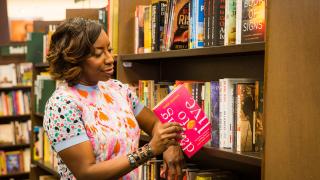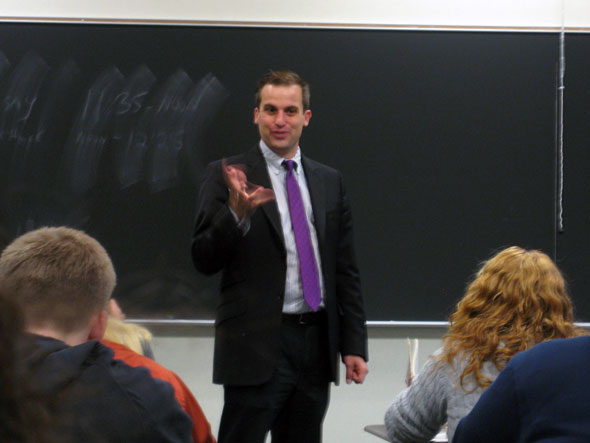
 Prof. Erik Bond leads his first-year seminar class called "Trauma, Text and the City." Photo by Alex Piazza.
Prof. Erik Bond leads his first-year seminar class called "Trauma, Text and the City." Photo by Alex Piazza.
Media outlets across the country often have the same perceptions of Detroit.
Blue-collar. Impoverished. Underdogs.
“Why is Detroit always considered the underdog?”
Erik Bond frequently asks that question during his first-year seminar course, “Trauma, Text and the City,” at the University of Michigan-Dearborn. There, about 20 students explore how artists and writers represent terror, violence, destruction and absence to describe indescribable suffering.
Twice a week, Bond and his students discuss events like 9/11 and the Greenwich Observatory bombing in London, as well as ongoing issues in Detroit. But instead of just studying the events, students examine how emails, photographs, novels, documentaries and films shape chaos to become part of urban history.
“It’s an open-ended topic,” said Bond, associate professor of English. “It introduces students to a field that’s exploratory. I want their answers. That’s the goal of the class.”
Ana Golematis thought she had signed up for an ordinary English class when she enrolled in “Trauma, Text and the City.” She was wrong, and Bond’s class has quickly become her favorite.
“He goes a lot deeper into it, so it’s not just an ordinary English class,” said Golematis, a freshman from Southgate. “This is like my favorite class to come to.”
The final project will require students to examine a traumatic event, like ongoing issues in Detroit, and then examine how that chaos is covered.
If they have a friend or family member who lives in Detroit, Bond suggests students ask them if their perceptions of the city differ from the national impression, Bond said. He believes some students who focus on Detroit for their final project will generate a variety of different perceptions.
“What possibilities does this alternate story have? What is shown to me in this narrative about Detroit and what is ignored? Why?"
Golematis said “Trauma, Text and the City” is her favorite course because of the class discussions.
“It’s all open discussion,” she said. “Everything is opinionated.”
She also analyzes media coverage of ongoing issues in Detroit more closely since enrolling in Bond’s course.
“Everything is just mediated,” said Golematis, in reference to media coverage. “They don’t want to say everything. Now I look at everything with a different perspective.”





